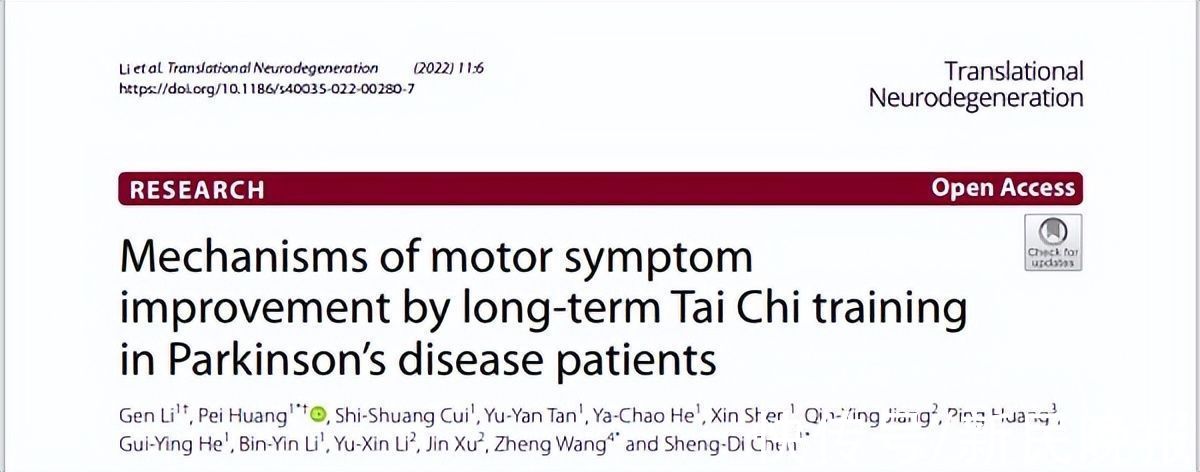
Caption: Professor Chen Shengdi (middle) and Xing Taiji “Pa You” interviewed the subject (below The same)
Xinmin Evening News (Reporter Yang Yuhong) The latest research shows that Taijiquan has a significant effect on the treatment of Parkinson’s disease and the prevention of Alzheimer’s disease. Professor Chen Shengdi’s team from the Department of Neurology of Ruijin Hospital recently published papers in the international authoritative medical journals Translational Neurodegeneration (“Translational Neurodegenerative Diseases”) and Alzheimer’s & Dementia (“Alzheimer’s Disease and Dementia”), confirming that adherence to Tai Chi training can effectively improve Motor symptoms in patients with Parkinson’s disease also have a significant effect in delaying memory decline and cognitive decline in patients with mild cognitive impairment.
This is also the “Tai Chi Assisted Treatment of Parkinson’s Disease” (referred to as “Tai Chi for Parkinson’s Disease”) jointly initiated by Shanghai Fosun Public Welfare Foundation, Star Tai Chi, and Neurology Department of Ruijin Hospital Phased scientific research results of two public welfare projects, “Tai Chi Training Delays Alzheimer’s Disease” (referred to as “Tai Chi Delays Alzheimer’s Disease”).
On March 15th, the research results of Professor Chen Shengdi’s team from the Department of Neurology of Ruijin Hospital on the intervention of Tai Chi-cognitive training in mild cognitive impairment (MCI), in the field of dementia research Published in the most influential and authoritative medical journal “Alzheimer’s Disease and Dementia”. The paper titled “Tai Chi enhances cognitive training effects on delaying cognitive decline in mild cognitive impairment” (“The effect of Tai Chi enhancing cognitive training on delaying cognitive decline in patients with mild cognitive impairment”) revealed that Tai Chi enhances cognitive decline in patients with MCI. enhanced the delaying effect of cognitive training on its cognitive decline.

Caption: Published in the journal Alzheimer’s Disease and Dementia

Caption: Published in “Transforming Neurological Changes” Papers in the Journal of Venereal Diseases
MCI is the prodromal stage of Alzheimer’s disease (AD), and it is also the best intervention period. Memory decline. Due to the risks of side effects and other risks in the early use of anti-AD drugs, non-drug interventions such as cognitive training and exercise training have attracted worldwide attention.
Chen Shengdi’s team has been deeply engaged in MCI non-drug intervention research for a long time. With the support of Fosun Foundation and Star Tai Chi, after multiple academic analyses such as small sample pre-test, Tai Chi program screening, and feasibility discussion of Tai Chi-cognitive joint training, the team took more than 3 years to complete the enrollment and grouping of MCI patients. intervention and follow-up. Clinical studies have found that Tai Chi-cognitive training can delay MCI memory decline and overall cognitive decline after 1 year. Compared with simple cognitive training, Tai Chi exercise can enhance the delaying effect of cognitive training on memory decline; however, training After 1 year, the existing training effect will gradually weaken, and when the training time is extended to 2 years, it can maintain a stable effect of delaying cognitive decline. Functional neuroimaging evaluation also found that neural activity was enhanced after combined training, reflecting the objective effect of Tai Chi-cognitive training on cranial neural activity. “This result suggests that the elderly can prevent and delay the occurrence of Alzheimer’s disease by practicing Tai Chi.” Chen Shengdi said.
On February 7th, another research result of the Fosun Foundation, Star Taiji and Prof. Chen Shengdi’s team was published in the international journal “Translational Neurodegenerative Diseases” . A paper titled “Mechanisms of motor symptom improvement by long-term Tai Chi training in Parkinson’s disease patients” The mechanism of action on the motor symptoms of patients further indicates that long-term Tai Chi training can significantly improve the motor symptoms of patients with Parkinson’s disease. This is also the second scientific research paper result of the “Tai Chi Anti-Parking” project.
The public welfare projects of “Tai Chi for Anti-Parkinesis” and “Tai Chi for Delaying Alzheimer’s Disease” were jointly organized by Fosun Foundation, Star Tai Chi and the team of Professor Chen Shengdi from the Neurology Department of Ruijin Hospital in 2015. Launched in 2018. Up to now, the “Tai Chi Anti-Parking” project has provided free public welfare courses (offline courses) for 445 Parkinson’s disease patients, and will continue to carry out Taijiquan learning public welfare courses for Parkinson’s disease patients across the country. At the same time, the “Tai Chi Delays Alzheimer’s Disease” project will also carry out more in-depth clinical research for 5 years, recruit more elderly people of appropriate age in the community for Tai Chi training, and examine the effects of longer-term Tai Chi training on cognition. Through the public welfare Tai Chi course, we can help more Alzheimer’s patients relieve their condition and make more contributions to reducing the occurrence and development of Alzheimer’s disease.